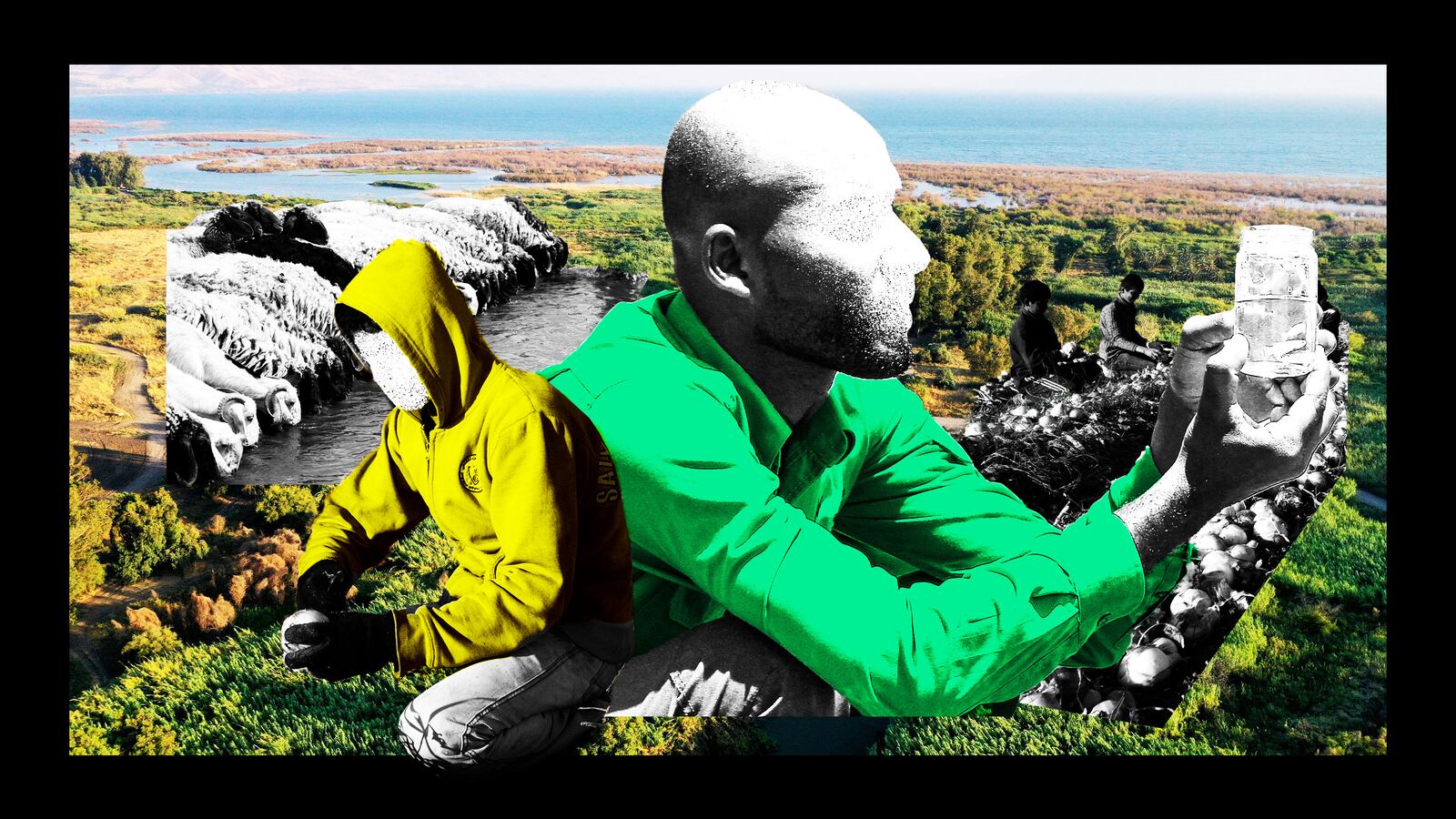Yehiya Moubarek would spend each day pacing behind his flock of sheep in the Jordan Valley, beating other shepherds to the water and green grass areas that were growing scarcer by the day due to climate change. About 20 years ago, a new competitor showed up: A group of environmental engineers had blocked off a portion of the land, using esoteric terms like “sustainable farming” to justify their actions. Struggling to get the land back, the shepherds began sabotaging the environmentalists’ project, trespassing on the sequestered land with their flocks, uprooting newly planted trees, and siphoning off water.
Then the environmentalists reached out to Moubarek with an olive branch: he could take a job with them, working with the scientists to regrow the ecosystem and save water.
“Lots of people were opposed to the project in the beginning, especially my own family. And I understand how they were thinking,” Moubarek told The Daily Beast, remembering the early days of the Jordan Valley’s EcoPark in 2004. “But when I spoke with the environmentalists, I felt that they were honest—these were people I could trust.”
The Jordan EcoPark is located in the northern section of the Jordan Valley, surrounding the Ziglab dam. Owned by the government, the land had unofficially served as grazing and farming grounds for the local community before the EcoPark project began with support from environmental group EcoPeace Middle East. Farmers had to find new grazing areas, with some community members forced to relocate.

Farmers and shepherds across the developing world face dire straits as climate change threatens their water sources.
MENAHEM KAHANA via GettyBut the partnership between Moubarek, his fellow shepherds, and the environmentalists has now restored nearly 55 acres of land from a degraded wasteland into a fertile ecosystem featuring some of the latest conservation technologies. Environmentalists were able to build wetlands in the dry landscape by using constructed wetlands, a form of water recycling where used water is naturally filtered and released into the environment. The project has brought new visitors to the area, enabling local community members to establish businesses in handicrafts, produce, and dairy.
More than a decade later, Moubarek now patrols the borders of the EcoPark, stopping to speak with shepherds whose sheep have encroached on the park’s borders.
Though he was hesitant at first, Moubarek understood that green pastures for his flock were growing harder to find due to overgrazing and unsustainable farming. “We gave Yehiya [Moubarek] a job and convinced him that you can graze your sheep another way,” Eshak Alguza, an environmental engineer who designed the EcoPark’s water filtration technology, told The Daily Beast. Moubarek, who has a large family in the Jordan Valley, helped lead the community to support the project. Since it began 18 years ago, their partnership has turned a parched portion of the Jordan Valley into a muddy wetland.

The wetland at Jordan's EcoPark recycles wastewater, cleaning and releasing it into the environment to restore the surrounding ecosystem.
MENAHEM KAHANA via GettyLike Moubarek, farmers and shepherds across the developing world face dire straits as climate change threatens their water sources. Jordan is one of the driest countries in the world, with the Jordan River dwindling to historic lows every passing year. Among agricultural communities, there is a conflict between the interests of individuals and communities, with farmers competing for water and grazing land. Sustainable farming practices, like growing crops that require less water, are often thrown by the wayside in pursuit of profits.
“Put yourself in the shoes of a farmer,” Lucas Beck, an environmentalist specializing in the Middle East and North Africa, told The Daily Beast. “Of course, they want to get the most out of their land as possible. This is a natural economic enterprise.”
The problems facing Jordan’s rural communities are common throughout sub-Saharan Africa and the Middle East. Climate change is often the main driver of flooding and rising sea levels. However, for dry countries like Jordan, climate change threatens to have the opposite effect: extended droughts, reduced rainfall, and increased evaporation of already shrinking bodies of water.
“The River Jordan, much like the Euphrates and the Blue Nile, originates from snow accumulation in the mountains,” Mohammad Mahmoud, director of the climate and water program at the Middle East Institute, told The Daily Beast. “The issue with warming is you’re not getting as much precipitation or snowpack accumulation.”

Sustainable farming practices, like growing crops that require less water, are often thrown by the wayside in pursuit of profits.
Marcus Yam via GettyAs water sources dry up in many parts of the world, countries are vying for a larger share of water. Ethiopia’s Renaissance Dam is threatening farmers in Egypt and Sudan with reduced water for their crops. Turkey and Iran’s new dams are reducing water from the Tigris and Euphrates rivers, which once nourished Iraq’s farms. And in Jordan, competition between Israel, Palestine, and Syria for water continues to plague regional politics. For many of the local communities living in water scarce regions, politicians have been slow and ineffective at fighting climate change.
“I’m an environmentalist, not a politician,” said Alguza. “But I’m not waiting for the politicians to reach a decision. I’m doing my job.”
Alguza installed Jordan’s first constructed wetland three years ago in the EcoPark, enabling the area to regrow without consuming the country’s valuable fresh water sources. The wetland recycles wastewater, cleaning and releasing it into the environment to restore the surrounding ecosystem.
“This is also how we educate people,” explained Alguza, who has trained farmers and shepherds who live in the community on how to conduct testing and perform maintenance on the water recycling system. “People stop by and ask what the constructed wetland is. We are bringing this reality to the community.”
In addition to technologies like drip irrigation, which helps farmers grow more crops with less water, water recycling mechanisms are growing in popularity across the Global South. One case study in Kenya found that lodges and resorts in environmentally sensitive areas are prime candidates for constructed wetlands, enabling the local tourism industry to minimize its environmental impacts while reaping financial benefits of being able to build more tourism sites in remote areas. Another study found that constructed wetlands have a high potential for use in North China, where many people live in rural settings far from cities. And in Morocco, studies of constructed wetlands have demonstrated their ability to produce water suitable for agricultural use.
“We’re trying to sell a model for sustainability,” Abdelrahman Sultan, the Jordanian deputy director of EcoPeace Middle East, told The Daily Beast. “This restoration project will ultimately benefit the whole region.”
Areas that currently support 70 percent of sub-Saharan Africa’s crop production will suffer from severe dryness and heat over the next three decades. Globally, climate change threatens to reduce global agricultural productivity by 17 percent by 2050.
For farmers and shepherds like Moubarek, and the communities that depend on them for food, the stakes couldn’t be higher—or more personal. “It’s different when you’re working to protect your home,” he said.






